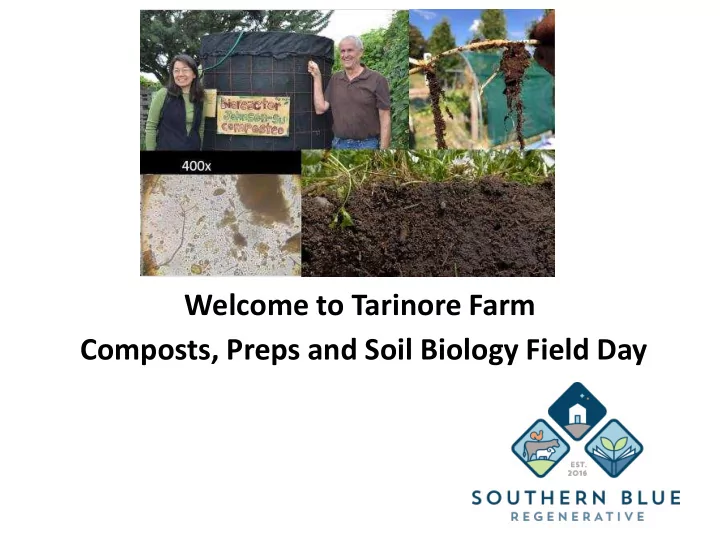

Welcome to Tarinore Farm Composts, Preps and Soil Biology Field Day
Program • Intro and House keeping • James Turnell, UNE • 12:30 – Lunch • Lee Fieldhouse – Island Biologicals • Discussion
What questions do you have? What did you want to learn/see/hear today?
Rule of Succession A species will move into an environment when the conditions become suitable for its establishment, and will move out of that environment when the conditions become unsuitable for its reproduction
Moredun – Richard Makim • Long term grazing history – taken up in 1825 • History of cropped areas and pasture “improvement” • Planned Grazing implemented across whole property • Areas that were just designated as grazing responded • Areas with cropping and ploughing history did not respond as well.
Moredun – St Straig ight grazin ing result lt 2004-2011 This 1.5% increase means the top 30cm of soil now can hold an additional 22mm of rainfall. BUT – researchers discarded this result as an “outlier”
Native Grass species recovering after 5-6 years of grazing management
“But some paddocks we couldn’t move the country with the holistic rotation [grazing] alone… there were too many sins related to toxins, irrigation, hard pans, pH and lack of plant growth and density to kick start the carbon and mulch etc.” Richard This was where the compost application in small amounts across a large area moved this from near the district average of 1% carbon to 5.5% carbon +63mm additional rainfall storage
However, there are limitations • Capital intensive • Time involved • Water required considerable even in temperate climate of the New England • Access to suitable material – tomato farm waste in this case
Johnson-Su BEAM • Process to create fungal-dominated compost • Over the 4.5 year trial he observed a 25-times increase in active soil fungal biomass and an annual average capture and storage of 10.27 metric tons soil C ha-1 year • Increase nutrient availability • And significant Increase crop establishment and yields
• Material • Woodchips, Leaves, any material to hand Key is to maintain aerobic conditions in the static pile • Vermicomposting • Add worms in once initial compost temp has fallen below 26 o C • Tube air holes will fill in and the worms maintain the aerobic conditions in the pile • Age – min 9-12 months to allow for fungal maturity
Use and Application • Extract the microbes from the compost material and apply with water spray at 1 kg of compost/hectare • Use as an inoculant for seed being sown – pasture, cover crops, forage or pasture crops
• Create a batter slurry • ½ cup of a milk/molasses mixture (8 parts milk to 1 part molasses) • a litre of compost • Water (amount varies - add the water while stirring until the compost slurry has a viscosity similar to pancake batter) • 1 litre of the resultant slurry used per 25kg of seed in a cement mixer then air dried before planting (wet planting can be done with larger seeds)
https://www.csuchico.edu/regenerativeagriculture /bioreactor Johnson-Su Composting Facebook Group https://www.facebook.com/groups/233254887357 239/
Wilmot – Stuart Austin • Setup in July 2017 and had three bio reactors • 25% Green waste - lawn clippings & leaves • 25% Fine wood shavings • 25% Coarse wood shavings • 25% Sorghum straw/mulch
Recommend
More recommend